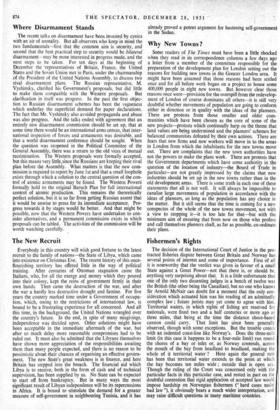Where Disarmament Stands
The recent talks on disarmament have been invested by cynics with an air of unreality. But all observers who keep in mind the two fundamentals—first that the common aim is security, and second that the best practical step to security would be bilateral disarmament—may be more interested in progress made, and the next steps to be taken. For ten days at the beginning of December the "representatives of Britain, France, the United States and the Soviet Union met in Paris, under the chairmanship :of the President of the United Nations Assembly, to discuss two rival disarmament plans. The Russian representative, M. Vyshinsky, clarified his Government's proposals, but did little to make them compatible with the Western proposals. But clarification in itself was progress. In the past the first objec- tion to Russian disarmament schemes has been the vagueness which underlay the superficial demand for paper declarations. The fact that Mr. Vyshinsky also avoided propaganda and abuse was also progress. And the talks ended with agreement that an entirely new disarmament commission should be set up, that at some time there would be an international arms census, that inter- national inspection of forces and armaments was desirable, and that a world disarmament conference should be sought. When the question was reopened in the Political Committee of the General Assembly, there was a return to the old vices of mutual recrimination. The Western proposals were formally accepted, butt this means very little, since the Russians are keeping their rival plan before the Assembly. What matters is that the new coin- mission is required to report by June 1st and that a small loophole _exists through which a solution to the central question of the con- trol of atomic armaments may be found. The Western Poweri" formally hold to the original Baruch Plan for full international control of atomic production. This remains the theoretically perfect solution, but it is so far from getting Russian assent that it would be unwise to press for its immediate acceptance. Pro- gress towards it by stages would be better. And that might be possible, now that the Western Powers have undertaken to con- sider alternatives, and a permanent commission exists in which • • proposals can be tabled. The activities of the commission will be worth watching carefully.






























 Previous page
Previous page